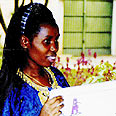
UNAIDS: Take Israel’s example
Alongside UN criticism, Israel receives praise from UNAIDS in special article on international prevention project in Jerusalem
Although UN organizations repeatedly criticized Israel over the years, there seemed to be cases where the country was commended.
UNAIDS chose Jerusalem AIDS Project’s (JAIP) educational program as a worldwide role model and featured a front page story on its website Thursday praising Israel’s HIV education and prevention programs.
“As the sun rises over the old city of Jerusalem, a new day begins for the volunteers of the Jerusalem AIDS Project – a major non-governmental organization in Israel promoting HIV education and prevention,” the article began.
“Since its inception, JAIP has developed the country’s advanced model for providing HIV education in: schools, higher education establishments, the military, among migrants and out of school young people,” the article continued.
JAIP Chair, Hanni Oren-Rosenberg said, "This is not the first time that our work is hailed internationally, but giving JAIP and Israel such a great visibility is very encouraging.”
'Israel’s moral duty'
Dr. Inon Schenker, senior HIV/AIDS prevention specialist at JAIP, noted that “It is Israel’s moral duty to take a serious, decisive and determined stance on AIDS in order to aid African countries in their fight against the epidemic."
“If one wants to be a member of the ‘global village’ one cannot turn his back to the most pressing health challenge in our village, being HIV/AIDS,” he emphasized.
JAIP is both a national and international organization which was founded 20 years ago and focuses on educating youth, teachers, doctors, and nurses on preventing HIV infection, stopping discrimination against virus carriers and patients, and promoting collaboration between disciplinary and national organizations on the issue.
The Jerusalem-based organization was asked to launch AIDS prevention programs in 27 different countries including Brazil, Argentina, Russia, Rwanda, South Africa, Germany, Peru, Nepal, The Philippines, and Kasachstan among others.
The organization also established a Middle Eastern network for AIDS education and prevention in 1995 which operates until the present day with the participation of Israeli, Palestinian, Egyptian, Jordanian, Turkish, and Moroccan education and health professionals.










